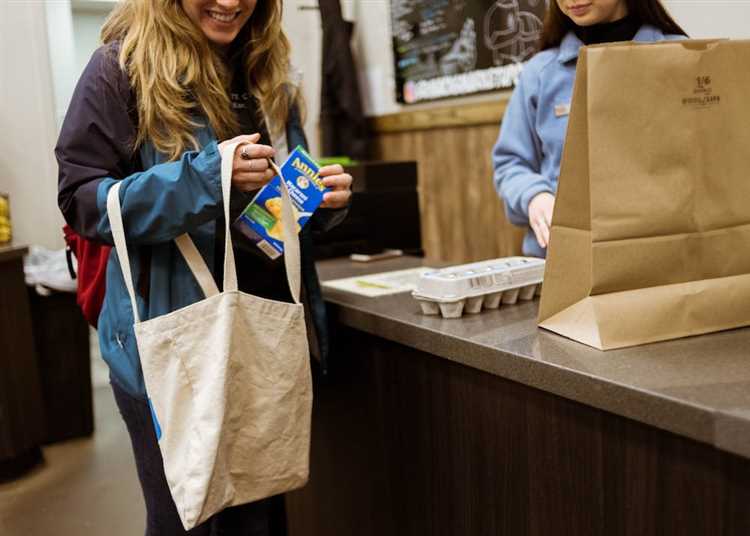As part of an ongoing effort to reduce waste and protect the environment, the state of Oregon has implemented a fee for single-use shopping bags. Starting from January 1st, 2020, customers are required to pay a fee for each non-reusable bag provided by retailers.
The goal of this initiative is to encourage shoppers to bring their own reusable bags and reduce the amount of plastic waste generated by single-use bags. By imposing a fee, Oregon aims to incentivize consumers to make more sustainable choices and consider the impact of their shopping habits on the environment.
The fee for shopping bags in Oregon is currently set at 5 cents per bag. This amount may seem small, but it can add up quickly, especially for frequent shoppers. By implementing this fee, the state hopes to deter the use of single-use bags and promote a shift towards more eco-friendly alternatives.
It is important to note that certain bags are exempt from this fee. Specifically, bags used for bulk items, produce, meat, fish, and prescriptions are not subject to the fee. Additionally, customers who rely on government assistance programs are exempt from paying for shopping bags.
Overall, the implementation of a fee for shopping bags in Oregon represents a significant step towards reducing waste and promoting sustainability. By encouraging consumers to bring their own reusable bags, the state aims to create a greener future for Oregonians and protect the beautiful natural environment that makes the state so special.
- Overview of the shopping bag fee in Oregon
- Reasons behind the fee
- How the fee works
- Impact of the fee
- Reasons behind the implementation of the fee
- Environmental concerns
- Economic benefits
- Impact of the shopping bag fee on the environment
- Consumer reaction and behavior towards the fee
- Adoption of reusable bags and alternatives
- Impact on business
- Economic implications of the shopping bag fee
- Impact on businesses
- Impact on consumers
- Overall impact
- Question-answer:
- What is the reason behind the fee for shopping bags in Oregon?
- How much is the fee for shopping bags in Oregon?
- Are reusable bags also subject to the fee in Oregon?
- How do retailers implement the bag fee in Oregon?
Overview of the shopping bag fee in Oregon

In Oregon, there is a fee for shopping bags in order to encourage the use of reusable bags and reduce plastic waste. This fee is commonly referred to as the “plastic bag ban” or “bag fee”. The legislation for this fee was first implemented in 2011 in Portland, and has since been expanded statewide.
Reasons behind the fee

The fee is intended to address the environmental impact of single-use plastic bags. These bags are not biodegradable and often end up in landfills or as litter in marine environments, causing harm to wildlife. By implementing a fee, consumers are encouraged to bring their own reusable bags when shopping, reducing the demand for plastic bags.
How the fee works
The shopping bag fee in Oregon requires retailers to charge customers 5 cents for each single-use carryout bag provided. This includes any bag that is not specifically designed and intended for reuse such as plastic bags, whether they are made of traditional plastic or biodegradable plastic. The fee does not apply to certain types of bags, such as bags used for bulk items, meat, produce, or prescription drugs.
Retailers are required to clearly display the fee near the point of sale so that customers are aware of the charge. The fee is added to the total cost of the purchase and appears as a separate line item on the receipt.
Impact of the fee
Since the implementation of the shopping bag fee, there has been a noticeable decrease in the use of single-use plastic bags in Oregon. Many consumers have switched to using reusable bags or opt for no bags at all. This has led to a reduction in plastic waste and a positive environmental impact.
| Benefits of the shopping bag fee in Oregon |
|---|
| Reduces plastic waste |
| Encourages the use of reusable bags |
| Protects wildlife and the environment |
| Raises awareness about the environmental impact of single-use plastic bags |
| Promotes sustainable consumer behavior |
Reasons behind the implementation of the fee

There are several reasons why Oregon implemented a fee for shopping bags:
Environmental concerns
One of the main reasons behind the fee is to reduce the use of single-use plastic bags, which have a damaging impact on the environment. Plastic bags are not biodegradable and often end up in landfills or as litter in rivers, streams, and oceans. This leads to pollution and harm to wildlife, as animals can mistake plastic bags for food.
By charging a fee for shopping bags, the hope is to encourage shoppers to bring their own reusable bags and reduce their reliance on single-use plastics. This would help decrease the amount of waste generated and lessen the environmental impact.
Economic benefits
In addition to environmental concerns, implementing a fee for shopping bags can also have economic benefits. Retailers in Oregon can use the revenue generated from the bag fees to offset the costs of procuring and providing bags. This can help businesses reduce their expenses and allocate funds towards other initiatives.
Furthermore, the implementation of the fee can also promote the use of locally produced reusable bags, which can support local businesses and contribute to the local economy.
The fee for shopping bags in Oregon is a step towards promoting environmental sustainability and reducing plastic waste while also providing economic advantages for retailers and local businesses.
Impact of the shopping bag fee on the environment

The implementation of a shopping bag fee in Oregon has had a positive impact on the environment. Prior to the fee, many consumers would use single-use plastic bags for their shopping, which contributed to plastic pollution and waste. By imposing a fee on shopping bags, consumers have been encouraged to switch to reusable bags, significantly reducing the number of single-use plastic bags in circulation.
One of the main benefits of the shopping bag fee is the reduction in plastic waste. Single-use plastic bags are a major source of litter, and they often end up in landfills or as marine debris. These bags take hundreds of years to decompose, causing long-term harm to the environment. By discouraging their use, the shopping bag fee has helped to prevent plastic waste from entering our ecosystems and causing harm to wildlife.
In addition to reducing plastic waste, the fee has also led to a decrease in the production of new plastic bags. The manufacturing process for plastic bags requires the use of fossil fuels and releases greenhouse gases into the atmosphere. By reducing the demand for plastic bags, the fee has helped to minimize the environmental impact associated with their production.
The shopping bag fee has also promoted the use of reusable bags, which have a much lower environmental impact compared to single-use plastic bags. Reusable bags are often made from materials like cotton or canvas, which are biodegradable and can be easily recycled. By encouraging the use of reusable bags, the fee has helped to promote sustainable shopping habits among consumers.
Overall, the implementation of a shopping bag fee in Oregon has had a positive impact on the environment. It has reduced plastic waste, minimized the production of new plastic bags, and promoted the use of reusable bags. These changes have not only benefited the natural environment, but also contribute to a more sustainable and eco-friendly society.
Consumer reaction and behavior towards the fee
Since the introduction of the fee for shopping bags in Oregon, consumers have shown a range of reactions and behaviors. Some individuals have embraced the change and actively engage in bringing their own reusable bags when shopping. These environmentally conscious shoppers appreciate the opportunity to reduce plastic waste and protect the environment.
Others, however, have expressed frustration and resistance towards the fee. Some consumers argue that the fee represents an additional financial burden, especially for low-income households. They feel that the fee adds up over time and impacts their ability to afford essential items. In response, some consumers have started to reduce their shopping or switch to stores that do not charge for bags.
Adoption of reusable bags and alternatives
As a result of the fee, there has been an uptick in the adoption of reusable bags among many consumers. Shoppers are now more conscious of their choices and carry reusable bags with them to avoid paying the fee. This change in behavior has also led to an increase in the sale of reusable bags and the availability of various bag options in stores.
In addition to reusable bags, some consumers have explored alternative options to avoid the fee. These alternatives include using backpacks, baskets, or carts to carry their items, or even repurposing bags from previous purchases. Some shoppers have also opted to consolidate their purchases or make fewer trips to the store to minimize the need for bags altogether.
Impact on business
The fee for shopping bags has had implications for businesses as well. While some establishments have reported a decrease in the use of single-use bags and an increase in the sale of reusable bags, others have seen a negative impact on their bottom line. Small businesses, in particular, have voiced concerns about the fee, as they fear it may deter customers or increase operating costs.
Overall, the consumer reaction and behavior towards the fee for shopping bags in Oregon is mixed. While there are those who support the initiative and have adapted to the change by using reusable bags, others have voiced concerns about the financial burden and sought alternative solutions. The long-term consequences and effectiveness of the fee remain to be seen, as consumers continue to navigate this new aspect of their shopping experience.
Economic implications of the shopping bag fee
The implementation of a shopping bag fee in Oregon would have several economic implications. While the primary goal of the fee is to reduce plastic bag usage and promote environmental sustainability, it would also affect businesses and consumers in various ways.
Impact on businesses
For businesses, implementing a shopping bag fee would come with both costs and potential benefits. Initially, businesses would need to invest in alternative packaging options such as reusable bags or paper bags, which could increase their expenses. However, in the long run, businesses may benefit from reduced costs associated with providing free plastic bags to customers.
Smaller businesses may face some challenges in adapting to the fee. They may have limited resources to invest in alternative packaging solutions and could experience a temporary decline in customer satisfaction if they are unable to provide free bags. However, these businesses could also have an opportunity to differentiate themselves by offering eco-friendly alternatives, attracting environmentally-conscious consumers.
Impact on consumers
For consumers, the shopping bag fee would serve as an additional cost for each store visit. While the fee may seem minimal (usually a few cents per bag), it can accumulate over time and affect the overall shopping budget, especially for low-income households. Consumers may need to adjust their purchasing habits or find alternative solutions, such as bringing their own reusable bags to avoid the additional expense.
On the positive side, the fee would encourage consumers to be more conscious of their environmental footprint and promote the use of reusable bags. Over time, this could result in a reduction in plastic bag usage and help preserve the environment.
Overall impact
The introduction of a shopping bag fee would have broader economic implications beyond just businesses and consumers. It could potentially contribute to a reduction in plastic waste and protect natural resources. Additionally, it could create opportunities for businesses to innovate and develop more sustainable packaging alternatives, leading to job growth in relevant industries.
However, it is essential to consider the potential regressive impacts of the fee on low-income households. To mitigate this, policymakers may need to explore strategies such as exemptions for individuals receiving government assistance or providing free reusable bags to those in need.
Ultimately, the economic implications of the shopping bag fee in Oregon are multifaceted. While there may be initial costs and adjustments for businesses and consumers, the long-term benefits of reduced plastic waste and environmental conservation are significant factors to consider.
Question-answer:
What is the reason behind the fee for shopping bags in Oregon?
In Oregon, the fee for shopping bags was introduced as a measure to reduce the use of single-use plastic bags. It is part of the state’s efforts to promote environmental sustainability and reduce plastic waste.
How much is the fee for shopping bags in Oregon?
The fee for shopping bags in Oregon is 5 cents per bag. This applies to both paper and plastic bags provided by retailers at checkout. However, there are exemptions for certain types of bags, such as bags for meat, produce, and prescription medication.
Are reusable bags also subject to the fee in Oregon?
No, reusable bags are not subject to the fee in Oregon. The fee only applies to single-use paper and plastic bags provided by retailers. Reusable bags are encouraged as an alternative to reduce waste and promote sustainability.
How do retailers implement the bag fee in Oregon?
Retailers in Oregon are responsible for charging the bag fee at checkout. They are required to add the 5-cent fee for each single-use paper or plastic bag provided to customers. The collected fees are used by retailers to cover the costs of the bags or to support environmental initiatives.